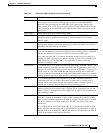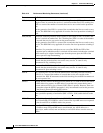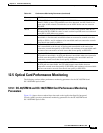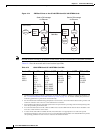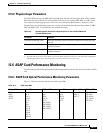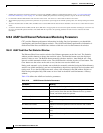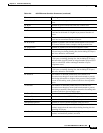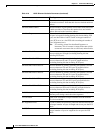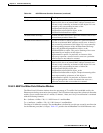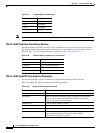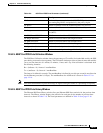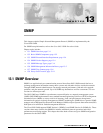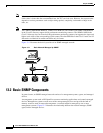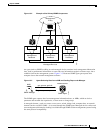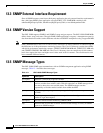
12-15
Cisco ONS 15600 Reference Manual, R7.2
Chapter 12 Performance Monitoring
12.6.2 ASAP Card Ethernet Performance Monitoring Parameters
12.6.2.2 ASAP Card Ether Ports Utilization Window
The Ether Ports Utilization window shows the percentage of Tx and Rx line bandwidth used by the
Ethernet ports during consecutive time segments. The Utilization window provides an Interval menu that
enables you to set time intervals of 1 minute, 15 minutes, 1 hour, and 1 day. Line utilization is calculated
with the following formulas:
Rx = (inOctets + inPkts * 20) * 8 / 100% interval * maxBaseRate
Tx = (outOctets + outPkts * 20) * 8 / 100% interval * maxBaseRate
The interval is defined in seconds. The maxBaseRate is defined by raw bits per second in one direction
for the Ethernet port (that is,1 Gbps). Table 12-7 provides the maxBaseRate for ASAP Ethernet cards.
dot3StatsInternalMacTransmitErrors A count of frames for which transmission on a particular
interface fails due to an internal MAC sublayer transmit error.
A frame is only counted by an instance of this object if it is not
counted by the corresponding instance of the
dot3StatsLateCollisions object, the
dot3StatsExcessiveCollisions object, or the
dot3StatsCarrierSenseErrors object.
dot3StatsFrameTooLongs A count of frames received on a particular interface that exceed
the maximum permitted frame size.
dot3StatsInternalMacReceiveErrors A count of frames for which reception on a particular interface
fails due to an internal MAC sublayer receive error. A frame is
only counted by an instance of this object if it is not counted by
the corresponding instance of the dot3StatsFrameTooLongs
object, the dot3StatsAlignmentErrors object, or the
dot3StatsFCSErrors object. The precise meaning of the count
represented by an instance of this object is
implementation-specific. In particular, an instance of this
object may represent a count of receive errors on a particular
interface that are not otherwise counted.
dot3StatsSymbolErrors A count of frames for which transmission on a particular
interface fails due to an internal MAC sublayer transmit error.
A frame is only counted by an instance of this object if it is not
counted by the corresponding instance of either the
dot3StatsLateCollisions object, the
dot3StatsExcessiveCollisions object, or the
dot3StatsCarrierSenseErrors object. The precise meaning of the
count represented by an instance of this object is
implementation-specific. In particular, an instance of this
object might represent a count of transmission errors on a
particular interface that are not otherwise counted.
Table 12-6 ASAP Ethernet Statistics Parameters (continued)
Parameter Meaning



